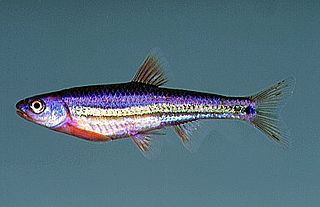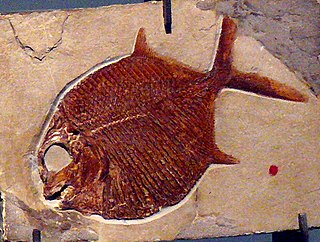
Pentatomidae is a family of insects belonging to the order Hemiptera, generally called shield bugs or stink bugs. Pentatomidae is the largest family in the superfamily Pentatomoidea, and contains around 900 genera and over 4700 species. As hemipterans, the pentatomids have piercing sucking mouthparts, and most are phytophagous, including several species which are severe pests on agricultural crops. However, some species, particularly in the subfamily Asopinae, are predatory and may be considered beneficial.

Francis Buchanan White was a Scottish entomologist and botanist.

Notropis is a genus of freshwater fish in the family Cyprinidae. They are known commonly as eastern shiners. They are native to North America, and are the continent's second largest genus.

Clausiliidae, also known by their common name the door snails, are a taxonomic family of small, very elongate, mostly left-handed, air-breathing land snails, sinistral terrestrial pulmonate gastropod mollusks.

Pycnodontiformes is an extinct order of bony fish. The group evolved during the Late Triassic and disappeared during the Eocene. The group has been found in rock formations in Africa, Asia, Europe, North and South America.

Corallimorphus is a genus of colonial anthozoans similar in appearance to sea anemones and in body format to scleractinian stony corals. These animals are cnidarians in the family Corallimorphidae. Members of the genus live off the Pacific coast of the US.
Putoidae is a family of scale insects commonly known as giant mealybugs or putoids. There is probably a single genus, Puto, containing about sixty species. The genus name Macrocerococcus has also been used but it is now considered to be a synonym of Puto. The genus Puto was formerly classified as a member of the Pseudococcidae; however, it so significantly differed from the rest of the Pseudococcidae that it was accorded its own family Putoidae.

Eurymela distincta is a species of leafhopper native to the Australian continent. It has a wedge-shaped body that is 10–12 mm long or 12–14 mm long. The head is black with cream or white maxillary plates. The pronotum and scutellum are black. The tegmen is black with a blue or purple tinge, and one to three white fasciae. The costal margin is black. Legs are scarlet close to the body and black further away. Underparts are scarlet.

Phylinae is a subfamily of insects in the family Miridae, the plant bugs.

Ischnodemus is a genus in the true bug family Blissidae. The review by Slater (1979) listed 95 species. The genus is found in all major zoogeographic regions, being most abundant on various species of Gramineae. The bodies of the adults are moderately to very elongated. The genus name was coined to refer to this slenderness, from the Greek ἰσχνόσ (ischnos) "feeble" and δέμασ (demas) "body".

Dysdercus is a widespread genus of true bugs in the family Pyrrhocoridae; a number of species attacking cotton bolls may be called "cotton stainers".

Coranus is a genus of assassin bugs in the tribe Harpactorini.

The big-scaled redfin, also known as the Japanese dace, is a medium-sized Asian fish. First described by Albert Günther in 1877 as Leuciscus hakonensis, it is the type specimen of the genus Tribolodon, having been described again as Tribolodon punctatum by Henri Émile Sauvage when he established that genus in 1883. It is the most widely distributed of the Tribolodon species, found over much of the Sea of Japan. It is known to carry a number of parasites, including the trematode species Centrocestus armatus, and the copepod species Ergasilus fidiformis, which is carried in the fish's gills.
Melanaethus is a genus of burrowing bugs in the family Cydnidae. There are about 15 described species in Melanaethus.
Tominotus is a genus of burrowing bugs in the family Cydnidae. There are about 11 described species in Tominotus.

Rhyparochromus is a genus of dirt-colored seed bugs in the family Rhyparochromidae. There are more than 40 described species in Rhyparochromus.

Dicranocephalus is the sole genus of true bugs in the family Stenocephalidae. There are about 30 described species in Dicranocephalus.
Asterodiaspis is a genus of true bugs belonging to the family Asterolecaniidae.
Carulaspis is a genus of true bugs belonging to the family Diaspididae.













